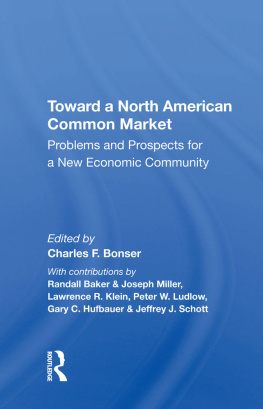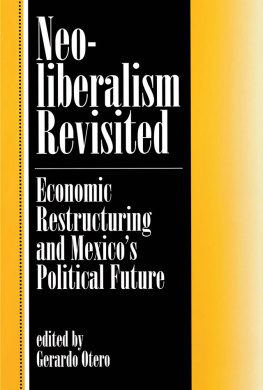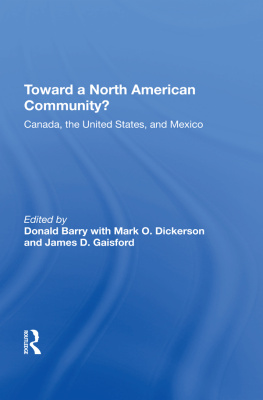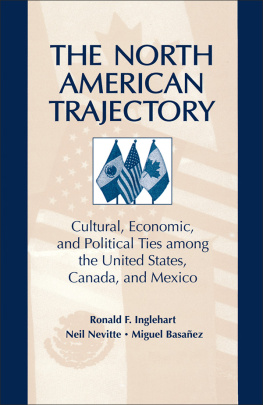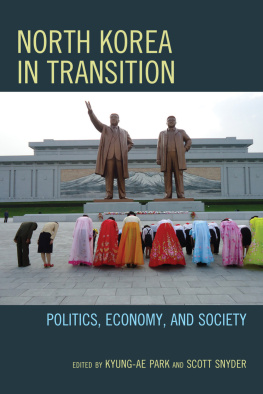Toward a North American Common Market
Toward a North American Common Market
Problems and Prospects for a New Economic Community
Edited by
Charles F. Bonser
With Contributions by
Randall Baker & Joseph Miller Lawrence R. Klein Peter W. Ludlow Gary C. Hufbauer & Jeffrey J. Schott
First published 1991 by Westview Press, Inc.
Published 2018 by Routledge
52 Vanderbilt Avenue, New York, NY 10017
2 Park Square, Milton Park, Abingdon, Oxon OX14 4RN
Routledge is an imprint of the Taylor & Francis Group, an informa business
Copyright 1991 Taylor & Francis
All rights reserved. No part of this book may be reprinted or reproduced or utilised in any form or by any electronic, mechanical, or other means, now known or hereafter invented, including photocopying and recording, or in any information storage or retrieval system, without permission in writing from the publishers.
Notice:
Product or corporate names may be trademarks or registered trademarks, and are used only for identification and explanation without intent to infringe.
Library of Congress Cataloging-in-Publication Data
Toward a North American common market: problems and prospects for a new economic community / edited by Charles F. Bonser.
p. cm.
Includes bibliographical references.
ISBN 0-8133-8127-4
1. North AmericaEconomic integration. 2. EuropeEconomic integration. I. Bonser, Charles F.
HC95.T69 1991
337.1'7dc20
91-11628
CIP
ISBN 13: 978-0-367-21194-3 (hbk)
Contents
, Charles F. Bonser
, Randall Baker and Joseph Miller
, Lawrence R. Klein
, Peter W. Ludlow
, Gary C. Hufbauer and Jeffrey J. Schott
, Charles F. Bonser
Guide
In February 1989 a small group of Indiana University international specialists were assembled by the University's Institute for Development Strategies to explore the idea of holding a high-level colloquium focused on the prospects for a North American Economic Community. The individuals participating in the session are listed below.
The group of I.U. experts agreed that such a program could make a valuable contribution to the "trialogue" on the subject and worked with the Institute for Development Strategies to select major presenters, participants, and to plan the event. The Colloquium was held at the Johnson Foundation's Wingspread Conference Center, April 26-28, 1990.
The subsequent announcement in June 1990 by Presidents Bush and Salinas that the United States and Mexico had agreed to initiate talks on a possible Free rade Agreement verified our judgement about the importance of the issue.
This volume is based on the papers commissioned for the colloquium, and on the panel and open discussions that were conducted at Wingspread. I would like to thank the planning committee for their many contributions to what turned out to be a very successful and timely seminar. I would also like to thank the Ameritech Foundation, whose support of our Institute's program made this effort possible; the Canadian Government for their financial assistance to the colloquium; and the Johnson Foundation for making available their beautiful Wingspread Conference Center and providing logistical support and hospitality for the meetings.
Obviously, the success of any meeting of this kind is primarily dependent on the background, skill, and openness of the participants. The four papers we commissioned for the meetings were outstanding and more than provided the foundation we needed for our discussions. Our panel discussants were well-prepared, to the point, and were successful in raising the relevant issues pertinent to the topic. The group discussions were thoughtful, articulate, stimulating, and fun. I am particularly grateful to the colloquium participants for taking time from their busy schedules to be with us for this event and for the open and candid way in which they participated in what turned out to be almost two days of wall-to-wall debate.
Finally, I would be remiss if I did not extend special thanks to my Doctoral Assistant, Julie Bivin, who was indispensable in planning and implementing the Wingspread meeting, and to my Executive Secretary, Nancy Croker, who did yeoman work in all phases leading to the successful completion of the event and in seeing this volume to completion.
Charles F. Bonser
Director
Institute for Development Strategies
Indiana University
1
Introduction
Charles F. Bonser
The United States, Canada, and Mexico clearly have complementary strengths that could benefit from closer economic ties. The idea of moving toward economic integration between the three countries is, therefore, not new, and has been raised, from time to time, by various individuals or organizations. Indeed, President Reagan proposed a "North American Common Market" during his first campaign for the Presidency. President Bush, in his 1988 campaign, also promised to work toward a North American free trade zone. Thus, in spite of the fact that there are very real political and economic problems associated with expanding the US-Canadian Free Trade Agreement to include Mexico, it is not surprising that current events have made such a prospect more than theoretical.
The agreement between the United States and Canada to establish a Free Trade Area to be fully effective by 1998 offers a major pillar for a North American Economic Community. Mexico, under new political leadership, has retreated from its previous pattern of economic protectionism, and has been undertaking reforms that have substantially improved its economic climate and its ability to contribute to and profit from a freer trading framework. In June 1990 the Mexican Senate approved a move to seek an FTA with the United States. President Salinas commented at that time, "Mexico will not be left out of the new world configuration. The speed of the changes requires decisive answers on all fronts, in all markets."
Factors external to North America are obviously affecting the timeliness of such a possibility. These include:
- The European Community's efforts to finalize their own economic integration by 1992, and the uncertain nature of its future trade posture vis--vis non-European nations. The EC also has negotiations underway with the EFTA states (Austria, Finland, Norway, Sweden, Switzerland, Iceland) concerning future trade relations, and has undertaken preliminary discussions with several Eastern European countries about the future of their economic relations with the Community.
- Australia and New Zealand have an established Free Trade Area, and have initiated discussions for an Asia-Pacific "regional cooperation organization." The Association of Southeast Asian Nations (ASEAN) officials (Thailand, Indonesia, Malaysia, the Philippines, and Brunei) have expressed concern about the EC 1992 changes, and the Europeans' past record of erecting trade barriers such as market sharing, quotas, and local content requirements. At their July 1990 meeting in Jakarta there was much discussion about trade cooperation, and indications that ASEAN would open treaty negotiations.
- There has so far been a notable lack of accomplishment in the current Uruguay Round of Talks on the General Agreement on Trade and Tariffs (GATT). If the talks conclude in December 1990 without considerably more progress than has been indicated so far, it is likely that there will be more interest in the establishment of regional trading blocs in the world economy. As regrettable as some would view that development, the US, Canada, and Mexico would form a large, powerful market of its ownupwards of355 million people which would be more potent in negotiations with other blocs than any of the three would be alone.

